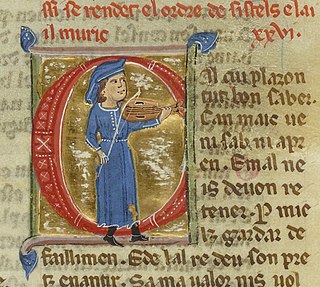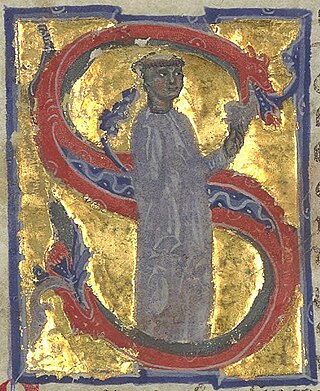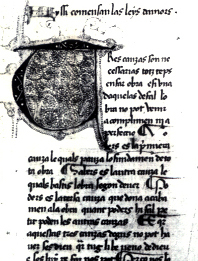
A troubadour ; Occitan: trobador[tɾuβaˈðu]) was a composer and performer of Old Occitan lyric poetry during the High Middle Ages (1100–1350). Since the word troubadour is etymologically masculine, a female troubadour is usually called a trobairitz.

Arnaut Daniel was an Occitan troubadour of the 12th century, praised by Dante as "the best smith" and called a "grand master of love" by Petrarch. In the 20th century he was lauded by Ezra Pound in The Spirit of Romance (1910) as the greatest poet to have ever lived.
Occitan literature is a body of texts written in Occitan, mostly in the south of France. It was the first literature in a Romance language and inspired the rise of vernacular literature throughout medieval Europe. Occitan literature's Golden Age was in the 12th century, when a rich and complex body of lyrical poetry was produced by troubadours writing in Old Occitan, which still survives to this day. Although Catalan is considered by some a variety of Occitan, this article will not deal with Catalan literature, which started diverging from its Southern French counterpart in the late 13th century.
Berengar is a masculine name derived from Germanic roots meaning "bear" and "spear". The name appears frequently among certain noble families during the Middle Ages, especially the Unruochings and those related. Bérenger is the French form, while Berengario is the Italian form, Berenguer is the Catalan form, and Berenguier or Berengier is the Occitan form. The Latin form is Berengarius and the female equivalent is Berengaria. Other forms of the name include Berenger, Bérenger, Bérangier, or Beringer.

Arnaut de Mareuil was a troubadour, composing lyric poetry in the Occitan language. Twenty-five, perhaps twenty-nine, of his songs, all cansos, survive, six with music. According to Hermann Oelsner's contribution to the 1911 Encyclopædia Britannica, Arnaut de Mareuil surpassed his more famous contemporary Arnaut Daniel in "elegant simplicity of form and delicacy of sentiment". This runs against the consensus of both past and modern scholars: Dante, Petrarch, Pound and Eliot, who were familiar with both authors and consistently proclaim Daniel's supremacy
Guillem is a Catalan first name, equivalent to William in the English language, which occasionally can appear as a surname. Its origin and pronunciation are the same as its Occitan variant Guilhèm, with a different spelling.
The sirventes or serventes, sometimes translated as "service song", was a genre of Old Occitan lyric poetry practiced by the troubadours.

Amanieu de Sescars or Amanieu des Escàs was a Catalan, possibly Gascon, troubadour of the late 13th century. Famous for his love songs in his own day, his contemporaries gave him the nickname dieu d'amor. He wrote two ensenhamens and two saluts d'amor that survive.
Arnaut Catalan was a troubadour active in the Languedoc, Catalonia, and Castile. He left behind five cansos, three tensos, and one religious song.
Arnaut Guilhemde Marsan was a Landais nobleman and troubadour. He was descended from a cadet branch of the viscounts of Marsan and was himself lord of Roquefort and Montgaillard and co-lord of Marsan.

An ensenhamen was an Old Occitan didactic poem associated with the troubadours. As a genre of Occitan literature, its limits have been open to debate since it was first defined in the 19th century. The word ensenhamen has many variations in old Occitan: essenhamen, ensegnamen, enseinhamen, and enseignmen.

The Consistori del Gay Saber was a poetic academy founded at Toulouse in 1323 to revive and perpetuate the lyric poetry of the troubadours.
Arnaut Plagues or Plages was a troubadour probably from Provence.
Arnaut Vidal de Castelnou d'Ari was a medieval Occitan author from Castelnaudary.
Floral Games were any of a series of historically related poetry contests with floral prizes. In Occitan, their original language, and Catalan they are known as Jocs florals. In French they became the Jeux floraux, and in Basque Lore jokoak. The original contests may have been inspired by the Roman Floralia held in honour of Flora.
Marsan is commune in Gers, France.
Berenguier is a given name and surname. Notable people with the name include:
Pons is a surname of Catalan origin. It is also given name. Within a person’s personal name, it is sometimes used as a first name or middle name.
This page is based on this
Wikipedia article Text is available under the
CC BY-SA 4.0 license; additional terms may apply.
Images, videos and audio are available under their respective licenses.




